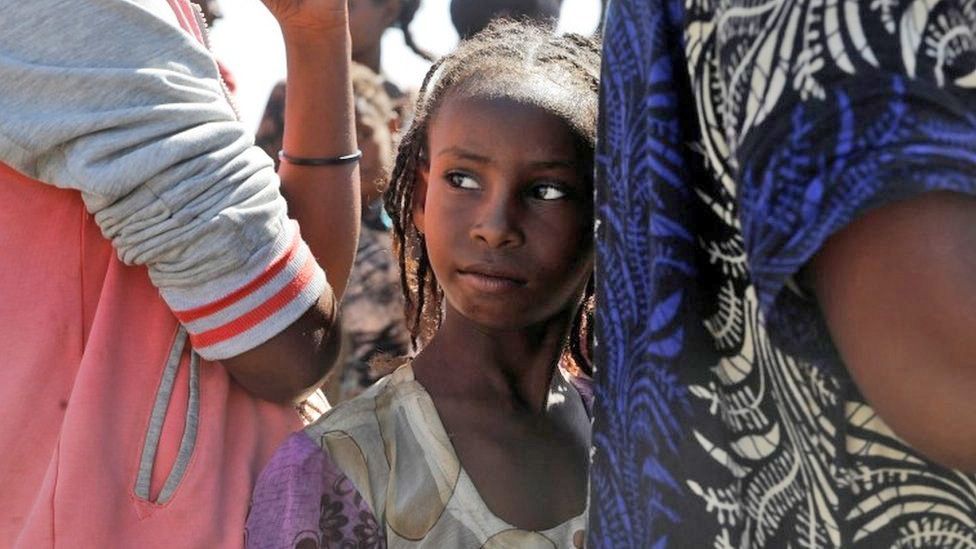Ethiopia and UN 'reach Tigray aid deal'
- Published

The UN and Ethiopia have agreed to allow aid into the country's conflict-torn Tigray region, UN officials say.
UN spokesman Saviano Abreu said an assessment mission would begin later on Wednesday. There has been no word so far from the Ethiopian government.
Food and medicines are said to be running out for millions of people.
Hundreds of people have reportedly been killed in the month-long fighting between the federal army and the Tigray People's Liberation Front (TPLF).
The Ethiopian government said the regional capital Mekelle was seized over the weekend, but TPLF soldiers said they were still fighting near the city.
The conflict has displaced tens of thousands of people, and sent a wave of refugees fleeing into Sudan.
The BBC’s Anne Soy reports from a refugee camp on the Sudan-Ethiopian border
In a separate development, the Ethiopian authorities said one of the most senior TPLF figures had surrendered. Keriya Ibrahim is the former speaker of the regional parliament.
The TPLF has not publicly commented on the issue.
What did the UN and Ethiopia reportedly agree on?
The UN will have "unimpeded, sustained and secure" access to deliver aid to the government-held areas of Tigray under the agreement, the UN's humanitarian agency Ocha said.
Spokesman Saviano Abreu said that the first mission to carry out a needs assessment would start on Wednesday.
"We are of course working to make sure assistance will be provided in the whole region and for every single person who needs it," Mr Abreu was quoted by the Associated Press as saying.
Separately, a UN source told Reuters the organisation had established a logistics group with the government to ensure access.
However, the government in Addis Ababa is yet to confirm the deal.
Among those in need of urgent aid in Tigray are thousands of refugees from neighbouring Eritrea. They fled political persecution and compulsory military service.
Meanwhile, communications have been fully restored in Alamata - a town on the south-eastern tip of Tigray. But towns in the western parts of the region saw only partial restoration of the services.
Communications blackouts since the start of the fighting have made it difficult to verify claims and counterclaims by the rival sides.
Moges, a resident of Alamata in his 20s, told the BBC that people in the town were terrified when they could hear the battle between government and TPLF forces.
"Since we didn't have any information, we were just imagining things. That was all we were thinking about," he said. "It was only in the last two or three days that we have started thinking about our future."
With communications now restored, life in Alamata - which Moges said did not suffer damage in the fighting - is getting back to normal.
But he said the family was worried about an uncle living in Humera, on the other side of Tigray, near the border with Sudan.
"We don't know what happened to him as the network is not restored there yet.''
Why are the government and TPLF fighting?
The TPLF dominated Ethiopia's military and political life for decades before PM Abiy Ahmed took office in 2018 and pushed through major reforms.
Last year, Mr Ahmed dissolved the ruling coalition, made up of several ethnically based regional parties, and merged them into a single, national party, which the TPLF refused to join.
Four things that explain the crisis in the Tigray region of Ethiopia
The feud escalated in September, when Tigray held a regional election, defying a nationwide ban on all polls imposed because of the coronavirus pandemic. Mr Abiy responded by calling the vote illegal.
The TPLF sees Mr Abiy's reforms as an attempt to hand his central government more power and weaken regional states.
It also resents what it calls the prime minister's "unprincipled" friendship with Eritrean President Isaias Afwerki.
Mr Abiy won the Nobel Peace Prize in 2019 for his efforts to bring peace with Eritrea.
The prime minister believes TPLF officials are undermining his authority.
Five things about Tigray:
1. The Kingdom of Aksum was centred in the region. Described as one of the greatest civilisations of the ancient world, it was once the most powerful state between the Roman and Persian empires
2. The ruins of the city of Aksum are a UN World Heritage Site. The site, dating from between the 1st and 13th Century AD, features obelisks, castles, royal tombs and a church which is believed by some to house the Ark of the Covenant
3. Most people in Tigray are Ethiopian Orthodox Christians. The region's Christian roots stretch back 1,600 years
Is this the home of the Ark of the Covenant?
4. The region's main language is Tigrinya, a Semitic dialect with at least seven million speakers worldwide
5. Sesame is a major cash crop, exported to the US, China and other countries
- Published29 June 2021
- Published26 November 2020
- Published14 November 2020